LATIKA M BOURKE: NATO boss Mark Rutte sets out new 5 per cent benchmark for defence spending
LATIKA M BOURKE: NATO members will turbocharge their defence spending to 5 per cent of GDP, based on the ‘brutally honest’ facts, adding to pressure on Anthony Albanese to increase funding.
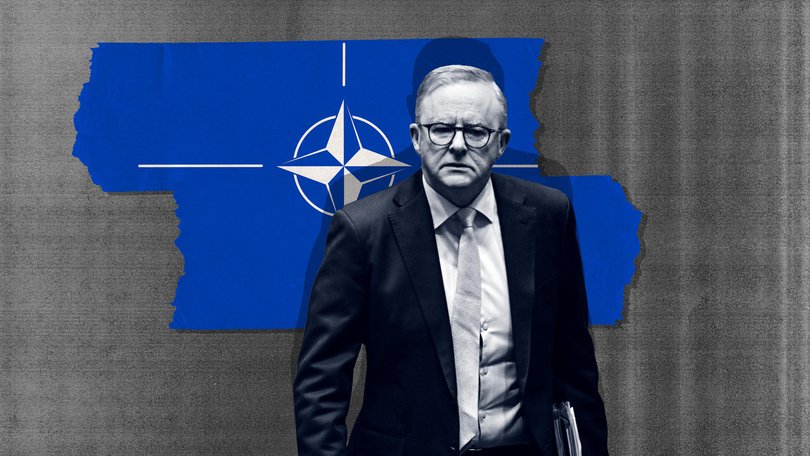
NATO members will turbocharge their defence spending to 5 per cent of GDP with the Alliance’s boss Mark Rutte warning “wishful thinking will not keep us safe.”
The new Western benchmark will add to domestic and international pressure on Prime Minister Anthony Albanese to lift Australia’s meagre defence output which is only projected to reach 2.3 per cent of GDP next decade.
Sign up to The Nightly's newsletters.
Get the first look at the digital newspaper, curated daily stories and breaking headlines delivered to your inbox.
By continuing you agree to our Terms and Privacy Policy.Declaring that Russia could be ready to attack NATO in five years, Secretary-General Mark Rutte said a “quantum leap” in collective defence was required following the Russian President Vladimir Putin’s illegal invasion of Ukraine.
“The world we thought we were entering after the Berlin Wall came down is definitely gone,” he said during a major address in London after meeting the UK’s Prime Minister Keir Starmer in Number 10.
“Vladimir Putin is clearly expansionistic,” Mr Rutte said.
“His economy is on a total war footing.
“That 2 trillion economy is producing four times as much ammunition as the whole of NATO is producing at the moment.
“We are 25 times bigger.”
He said NATO needed a 400 per cent increase in air and missile defence, more armoured tanks and vehicles, millions more artillery shells, drones and long-range missiles.
The UK Labour government last week released its long-awaited defence review and pledged to raise spending to 2.5 per cent of GDP by 2027, with the intention to go to 3 per cent by 2033.
Mr Rutte praised Britain’s targets and said if political leaders did not adequately fund the protection of their societies, they would continue to have their subsidised health and pension systems, but warned: “You’d better learn to speak Russian.”
“That’s the consequence,” he said.
“When I came to NATO, people sometimes told me, ‘yeah, but Mark, bringing the brutal facts out in the open might also rattle our populations.’”
“Yes, they better be rattled because this is the reality.
“Our task as politicians is to be brutally honest about how we see the facts.
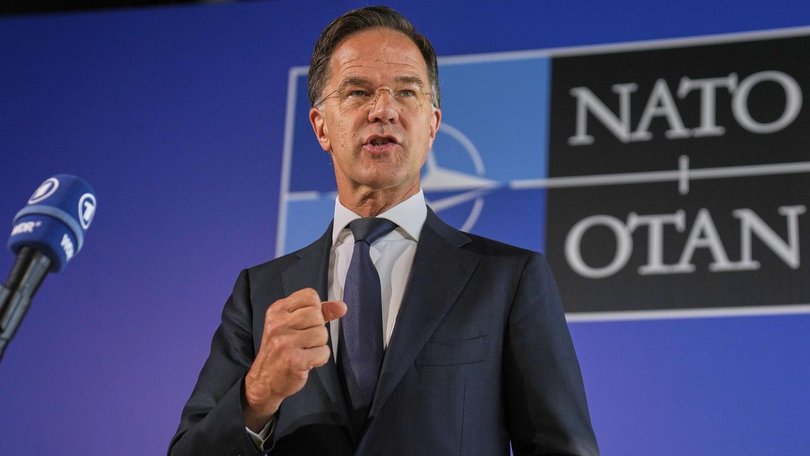
“And the facts are clearly there, that Russia is able within five years to mount a credible attack against NATO territory.”
He stressed China’s increasing collaboration with Russia, as well as Iran and North Korea.
“We cannot think there is one theatre that is the Euro-Atlantic theatre,” he said.
“We have to be conscious of the fact that it is all interconnected.
“And Russia’s unprovoked, ongoing war against Ukraine clearly shows that all these countries work together.”
He said China was building up its nuclear arsenal and aimed to have 1000 warheads by 2030.
NATO’s increased spending pledge will be made at the annual summit in the Hague scheduled for later this month, Mr Rutte said, but he gave no timeline for when it would have to be met.
The 5 per cent promise will be split into a 3.5 per cent commitment on core defence spending like submarines, ships and fighter jets and weapons and the remaining 1.5 per cent on defence-related investment.
That could include upgrading roads and bridges that can carry heavy tanks or buying factories for reindustrialisation. It could also be put towards societal resilience programs to train and help people respond to conflict as well as natural disasters such as bushfires and floods.
A 5 per cent target would exceed the United States’ current defence spending levels and more than double the 2 per cent promise made at the Wales summit in 2014, which member states have been slow to reach.
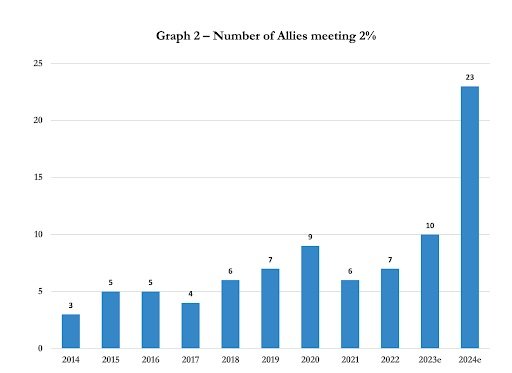
In 2014, just three nations, the US, UK and Greece met the 2 per cent target. In 2023 the number was only 10 but shot up to 23 last year, led by Poland, Estonia, the US and Latvia.
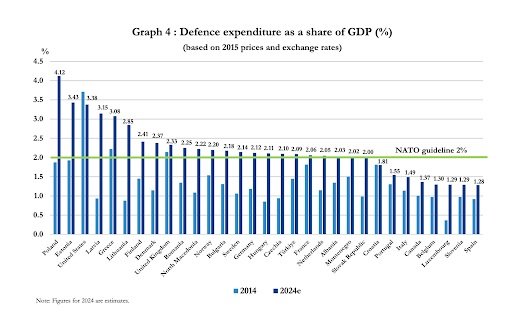
Europe’s overall sluggishness provoked US President Donald Trump’s wrath – he has blasted European leaders for not doing enough to bankroll their own security and threatened to break the alliance.
Mr Rutte said that until Mr Trump became President, “nothing happened and then everyone woke up.”
But he said spending more on defence was not about “pleasing an audience of one” but “protecting one billion people.”
“The home front and the front line are now one and the same,” Mr Rutte said.
“War is no longer fought at a distance – our societies and militaries are in this together.”
Regardless, Europe’s belated efforts to rearm appear to have mollified key figures in the Trump Administration.
“If and when allies adapt on critical matters like defence spending, they can expect not only praise but a willing, energetic, and open partner,” Elbridge Colby, Under Secretary of Defence, said on X on Monday in response to an article suggesting Europe was now in the United States’ good books.
The pacifying overture is significant as Mr Colby is a fierce advocate of the America First mentality and has been one of Europe’s strongest critics, and has even questioned whether the US should sign off on delivering Australia nuclear-powered submarines under AUKUS.
Mark Carney became the latest centre-left prime minister to announce he would match the existing NATO target of 2 per cent.
Canada has been one of NATO’s biggest shirkers, spending 1 per cent of GDP on defence in 2014 and 1.37 per cent in 2024. He said Canada would reach 2 per cent by the end of the fiscal year next March.
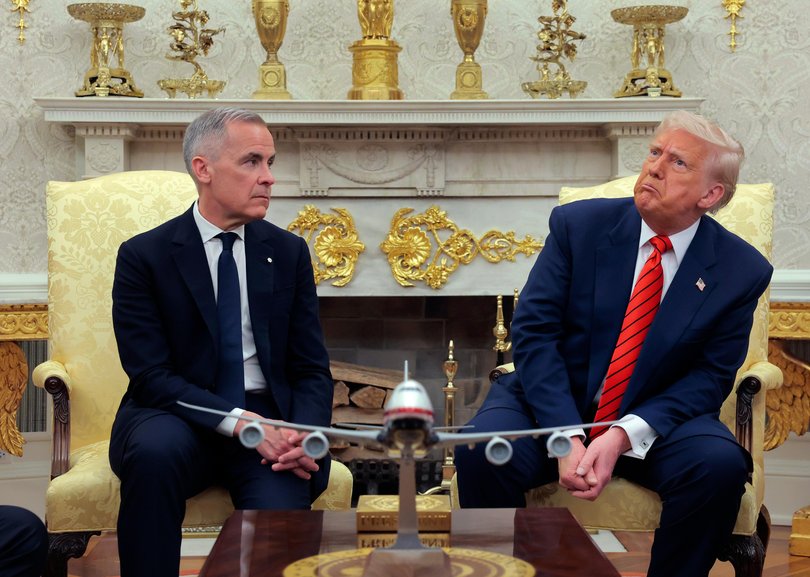
Mr Carney said the US was monetising its hegemony and the era of US dominance was over.
“The United States is beginning to monetise its hegemony: charging for access to its markets and reducing its relative contributions to our collective security,” Mr Carney said in a major speech.
“We stood shoulder to shoulder with the Americans throughout the Cold War and in the decades that followed, as the United States played a dominant role on the world stage.
“Today, that dominance is a thing of the past”.
At the heart of NATO is its collective defence deterrence clause which says an attack on one will be considered an attack on all.
The only time that Article 5 clause has been triggered was in support of the United States war in Afghanistan after the September 11 attacks.
Despite fears that Mr Trump’s threats to quit NATO have undermined Article 5, Mr Rutte said the United States remained firm and that its desire to focus more on the threat from China in the Indo-Pacific would not create a capability gap in Europe.
“I have no worry about that,” he said.
NATO, comprising 32 member countries across Europe, as well as Canada and the United States, has developed an Indo-Pacific partnership with Australia, Korea, Japan and New Zealand to collaborate on countering China.

